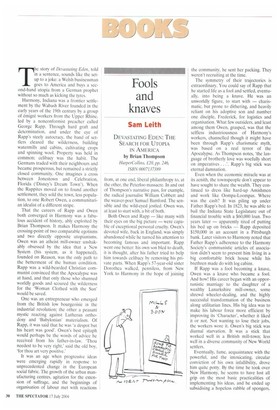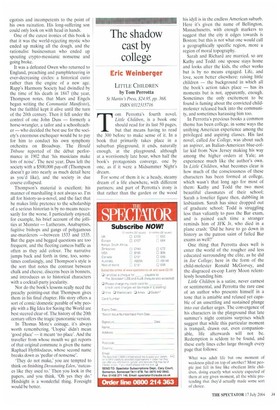Fools and knaves
Sam Leith
DEVASTATING EDEN: THE SEARCH FOR UTOPIA IN AMERICA by Brian Thompson HatperCollins, £20, pp. 246, ISBN 0007137389 The story of Devastating Eden, told in a sentence, sounds like the setup to a joke: a Welsh businessman goes to America and buys a second-hand utopia from a German prophet without so much as kicking the tyres.
Harmony, Indiana was a frontier settlement by the Wabash River founded in the early years of the 19th century by a group of émigré workers from the Upper Rhine, led by a nonconformist preacher called George Rapp. Through hard graft and determination, and under the eye of Rapp's steely autocracy, the band of settlers cleared the wilderness, building watermills and cabins, cultivating crops and spinning wool. Property was held in common; celibacy was the habit. The Germans traded with their neighbours and became prosperous, but remained a strictly closed community. One imagines a cross between Jonestown and Celebration, Florida (Disney's Dream Town'). When the Rappites moved on to found another settlement, they sold the town, less population, to one Robert Owen, a communitarian idealist of a different stripe.
That the careers of Rapp and Owen both converged in Harmony was a fabulous accident of history, ably exploited by Brian Thompson. It makes Harmony the crossing-point of two comparable egotisms and two directly opposite utopianisms. Owen was an atheist mill-owner unshakably obsessed by the idea that a New System (his system, as it happened), founded on Reason, was the only path to the betterment of the human condition. Rapp was a wild-bearded Christian communist convinced that the Apocalypse was at hand, and that only those who shunned worldly goods and scoured the wilderness for the 'Woman Clothed with the Sun' would be saved.
One was an entrepreneur who emerged from the British low bourgeoisie in the industrial revolution; the other a peasant mystic reacting against Lutheran orthodoxy and 'Babylonian' materialism. Of Rapp, it was said that he was 'a despot but his heart was good'. Owen's best epitaph would perhaps be the words of advice he received from his father-in-law. 'Thou needest to be very right,' said the old boy, `for thou art very positive.'
It was an age when progressive ideas were emerging rapidly in response to unprecedented change in the European social fabric. The growth of the urban manufacturing centres, agitation for the extension of suffrage, and the beginnings of organisation of labour met with reactions from, at one end, liberal philanthropy to, at the other, the Peterloo massacre. In and out of Thompson's narrative pass, for example, the radical journalist William Cobbett and the weaver-poet Samuel Bamford. The sensible and the wild-eyed jostled. Owen was, at least to start with, a bit of both.
Both Owen and Rapp — like many with their eyes on the big picture — were capable of exceptional personal cruelty. Owen's devoted wife, back in England, was simply abandoned while he turned his attention to becoming famous and important. Rapp went one better: his own son bled to death, it is thought, after his father tried to help him towards celibacy by removing his private parts. When Rapp's 57-year-old sister Dorothea walked, penniless, from New York to Harmony in the hope of joining the community, he sent her packing. They weren't recruiting at the time.
The symmetry of their trajectories is extraordinary. You could say of Rapp that he started life as a fool and settled, eventually, into being a knave. He was an unworldly figure, to start with — charismatic, but prone to dithering, and heavily reliant on his adoptive son and number one disciple, Frederick, for logistics and organisation. What few outsiders, and least among them Owen, grasped, was that the selfless industriousness of Harmony's workers, channelled though it might have been through Rapp's charismatic myth, was based on a real terror of the Apocalypse. As Thompson notes, 'the language of brotherly love was woefully short on imperatives ...'. Rapp's big stick was eternal damnation.
Even when the economic miracle was at its zenith, the townspeople don't appear to have sought to share the wealth. They continued to dress like hard-up Amishmen and work like Oompa-Loompas. Where was the cash? It was piling up under Father Rapp's bed. In 1823, he was able to bail the Indiana State Legislature out of financial trouble with a $60,000 loan. Two years later — apparently tired of putting his bed up on bricks — Rapp deposited $150,000 in an account in a Pittsburgh bank. Later visitors to Harmony noted that Father Rapp's adherence to the Harmony Society's communistic articles of association didn't seem to prevent him living in a big comfortable brick house while his brethren made do with log cabins.
If Rapp was a fool becoming a knave, Owen was a knave who became a fool. And how! His career began with an opportunistic marriage to the daughter of a wealthy Lanarkshire mill-owner, some shrewd wheeler-dealing, and the highly successful transformation of the business along utilitarian lines. His big idea was to make his labour force more efficient by improving its `Character', whether it liked it or not. Not wanting to lose their jobs, the workers wore it. Owen's big stick was diurnal starvation. It was a stick that worked well in a British mill-town; less well in a diverse community of New World settlers.
Eventually, fame, acquaintance with the powerful, and the intoxicating, circular conviction of his own infallibility, drove him quite potty. By the time he took over New Harmony, he seems to have lost all grip on the most basic practicalities of implementing his ideas, and he ended up subsidising a hopeless rabble of spongers, egotists and incompetents to the point of his own ruination. His long-suffering son could only look on with head in hands, One of the cutest ironies of this book is that it was the world-rejecting mystic who ended up making all the dough, and the rationalist businessman who ended up spouting crypto-messianic nonsense and going broke.
It was a defeated Owen who returned to England, preaching and pamphleteering in ever-decreasing circles: a historical curio rather than the engine of a new age. Rapp's Harmony Society had dwindled by the time of his death in 1847 (the year, Thompson notes, that Marx and Engels began writing the Communist Manifesto), but the faithful kept it alive until the turn of the 20th century. Then it fell under the control of one John Duss — formerly a horse-wrangler, a tailor and a schoolteacher — who decided the best use for the society's enormous exchequer would be to pay for him to conduct his own symphony orchestra on Broadway. The Herald Tribune reported of the debut performance in 1902 that 'his musicians make lots of noise'. The next year, Duss left the society with a $500,000 pay-off (Thompson doesn't go into nearly as much detail here as you'd like), and the society in due course collapsed.
Thompson's material is excellent; his manner of marshalling it not always so. I'm all for history-as-a-novel, and the fact that he makes little pretence to the scholarship of a serious historian is by no means necessarily for the worse. I particularly enjoyed, for example, his brief account of the jollities at Munster — Lutherans, Anabaptists, fugitive bishops and gangs of polygamous axe-murderers —between 1533 and 1535. But the gaps and begged questions are too frequent, and the fleeting cameos baffle as often as they add colour. The narrative jumps back and forth in time, too, sometimes confusingly, and Thompson's style is the sort that notes the contrast between chalk and cheese, discerns bees in bonnets, and introduces us to historical characters with a cocktail-party jocularity.
Nor do the hook's lessons really need the preachy pointing-out that Thompson gives them in his final chapter. His story offers a sort of comic/domestic parable of why people with a Big Idea for Saving the World are best steered clear of. The history of the 20th century offers the tragic/panoramic version.
In Thomas More's coinage, it's always worth remembering, 'Utopia' didn't mean 'good place' — it meant `no place'. And the traveller from whose mouth we get reports of that original commune is given the name Raphael Hythlodaeus, whose second name breaks down as 'pedlar of nonsense'.
'They do not make,' you are tempted to think on finishing Devastating Eden, 'nutcases like they used to.' Then you look in the papers, and you think, 'Oh yes they do.' Hindsight is a wonderful thing. Foresight would be better.



























































 Previous page
Previous page